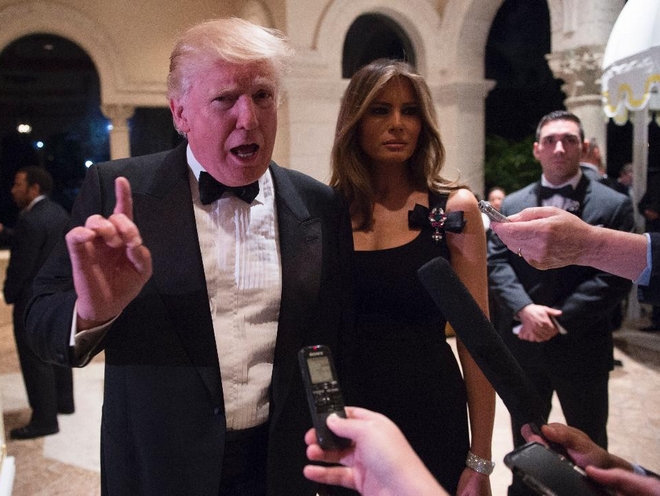
President-elect Donald Trump accompanied by future First Lady Melania during his New Year's Eve at Mar-a-Lago in Palm Beach, Florida. Trump has called
US President-elect Donald Trump on Tuesday named Robert Lighthizer, an official in the Reagan administration and harsh critic of China's trade practices, to be his chief trade negotiator, responsible for better deals aimed at reducing US trade deficits.
Trump, who promised during his presidential campaign to renegotiate international trade deals like NAFTA and punish companies that ship work overseas, said in announcing his choice that Lighthizer would help "fight for good trade deals that put the American worker first.
"He has extensive experience striking agreements that protect some of the most important sectors of our economy, and has repeatedly fought in the private sector to prevent bad deals from hurting Americans," Trump said in an e-mailed statement. "He will do an amazing job helping turn around the failed trade policies which have robbed so many Americans of prosperity."
China critic
Lighthizer, 69, who was deputy trade representative during the Reagan administration, would replace Michael Froman, the Obama administration's representative who led negotiations on a Pacific trade pact that would have covered nearly 40 percent of the global economy and was seen as a counterpoint to China's rising clout.
Lighthizer has previously accused China of unfair trade practices, in line with views held by Peter Navarro, a China critic who Trump last month named to head a newly formed White House National Trade Council. Lighthizer has argued that China has failed to live up to commitments made in 2001 when it joined the World Trade Organization and that tougher tactics are needed to change the system, even if it means deviating from World Trade Organization rules.
In a 2011 article published in the Washington Times, Lighthizer said that using tariffs to promote American industry was a Republican tenet harking back to pro-business politicians who established the party.
"Years of passivity and drift among US policymakers have allowed the US-China trade deficit to grow to the point where it is widely recognized as a major threat to our economy," Lighthizer wrote in 2010 congressional testimony.
"Going forward, US policymakers should take these problems more seriously, and should take a much more aggressive approach in dealing with China," he wrote.
Lighthizer is regarded as an experienced tactician with an intimate knowledge of trade tools that were widely used before the WTO was created in 1995, including "Section 301" tariffs used to stem a tide of imports of Japanese steel and vehicles in the 1980s.
During his tenure, Reagan struck the 1985 Plaza Accord currency deal with Japan, Germany and other major trading partners that brought down the dollar's value and encouraged more foreign companies to set up US manufacturing plants.
"Bob Lighthizer is very smart, very strategic and totally fearless," said a Washington attorney who has worked with him for three decades but asked not to be named. "You can expect him to use every tool available to create leverage to get China and anyone else to stop the cheating. He is no fan of the WTO."
China says it will win Trump trade war
On Tuesday, unnamed trade officials and economic advisers said that the Chinese economy could withstand trade tariffs mainly because exports were no longer a driving factor for growth, according to a report by the People's Daily, the mouthpiece of the Communist Party of China.
Trump has said that he would slap tariffs as high as 35 percent on certain Chinese goods. China would likely retaliate against unfair trade practices by the new US government. What is unclear is whether the US under Trump would adhere to WTO rulings on trade disputes.
Although it was not mentioned in the report, another way China could impact trade would be to allow the renmimbi to free-float. The currency is controlled by the government and not allowed to depreciate by more than around 4 percent. But that could change. If the US slapped punitive trade tariffs on products deemed important to China's massive working-class labor market, China could weaken the currency and make it impossible for US competitors to compete on price outside of the US.
On December 29, the People's Daily surveyed over 1,500 people throughout China regarding the possibility of worsening relations under Trump. According to the poll, 79.8 percent said that the US was China's most important relationship. In second place was Russia, with only 37.2 percent saying the same thing.
The party-owned newspaper also published an op-ed on December 30 that hinted to the possibilities for stronger investment ties between the two countries.
"Rather than bash China, perhaps America should learn from and work with China," read the op-ed by writer Curtis Stone. "Trump wants to spend $1 trillion on infrastructure upgrades in America to rebuild the nation and put people back to work. The problem is how to pay for it and how to do it. China knows how to fund and carry out serious infrastructure building, and deep-pocketed Chinese investors want to invest billions in America.”
One way for Trump to make that happen is to count on Chinese foreign capital, which in the best case scenario is used in addition to or instead of government infrastructure loans.
China has only recently become a foreign direct investor in the US. It owns a number of US companies today, including AMC Theaters, a nationwide chain of movie theaters.
| Touched | Sympathetic | Bored | Angry | Amused | Sad | Happy | No comment |